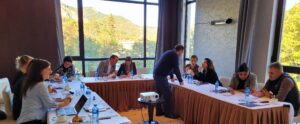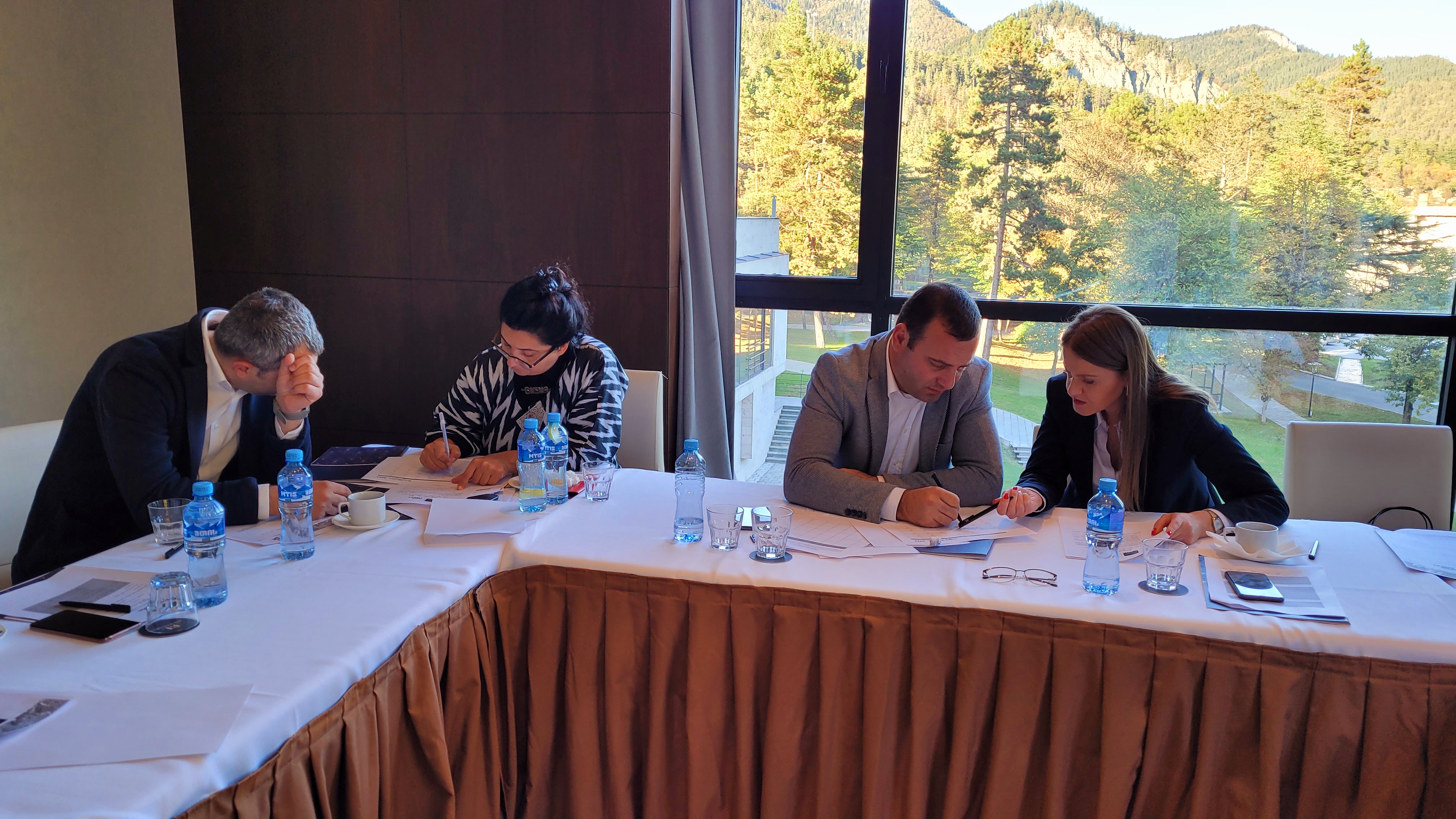Georgian Municipalities Engage in the Co-Creation of Their OGP Action Plans
This publication was produced with the financial support of the European Union. Its contents are the sole responsibility of the Open Government PartnershipThe Open Government Partnership (OGP) is a multi-stakeholder initiative focused on improving government transparency, ensuring opportunities for citizen participation in public matters, and strengthen... More and do not necessarily reflect the views of the European Union.
“Membership of OGP Local is a push for better governance, and this does not only involve openness. Creating and offering services tailored to the needs of citizens in all areas and directions, in cooperation with the civil society and the involvement of the local population, is the main challenge,” noted a representative of Khoni Municipality during a co-creation workshop last month. Six OGP Local members participated in the workshop, including the capital Tbilisi, Kutaisi, Rustavi, Akhaltsikhe, Khoni, and Ozurgeti; all which are currently co-creating their OGP action plans with civil society organizations. Participation in OGP Local has indeed raised the incentives of some Georgian municipalities to showcase their success stories of open, inclusive, and accountable policy-making between each other and with national and global audiences.
Each municipality has a different context, so they were particularly eager to share their experiences with their peers. For example, Khoni City Hall is conducting consultation meetings with thematic multi-stakeholder councils within the municipality as part of their co-creation processCollaboration between government, civil society and other stakeholders (e.g., citizens, academics, private sector) is at the heart of the OGP process. Participating governments must ensure that a dive.... This includes the GenderOGP participating governments are bringing gender perspectives to popular policy areas, ensuring diversity in participatory processes, and specifically targeting gender gaps in policies to address gov... More Equality Council, Council of People with Special Needs, and the Citizen Advisory Council. They are also planning meetings in different administrative units selected based on their status as the tourist zone, lowland, mountainous, and most remote areas, and settlements with an abundance of youthRecognizing that investing in youth means investing in a better future, OGP participating governments are creating meaningful opportunities for youth to participate in government processes. Technical ... More and underrepresented groups, including women, ethnic and religious minorities, people with disabilitiesA government is not open unless it is accessible to all, and governments are working to ensure people with disabilities are afforded equitable services and opportunities to participate. Technical spec..., pensioners, and people living below the poverty line. The goal of these consultations is to inform regular citizens about the OGP process and to identify priorities for their upcoming OGP commitments.
As new members of OGP Local, Kutaisi and Rustavi City Halls started off with information meetings with relevant municipal public officials and CSOs engaged in the co-creation process. In the next stage, they will conduct stakeholder meetings with thematic municipal councils and hold public consultations in administrative units with the help of condominium and apartment owners. Similarly, Tbilisi is contemplating organizing thematic consultation meetings in the capital neighborhoods with a special focus on building green spaces and recreational areas.
In Ozurgeti, the public consultation process is led by the Local Council (Sakrebulo), which has a successful track record of introducing innovative mechanisms for increased openness in the work of the local legislature, such as the livestreaming of Sakrebulo sessions in community centers of rural settlements, which have already garnered over 1,000 views.
Workshop participants also shared a set of important suggestions on how their OGP process can be adapted to better suit their local context. Here’s what we heard:
- Timeline: The municipalities conduct public consultations for drafting the municipal budget in November of each year, which is an opportunity to align with co-creation of OGP Local commitments. This would increase the visibility of and interest in OGP Local but also save the time and resources of both the local government and the public to engage in the process.
- Multi-Stakeholder ForumRegular dialogue between government and civil society is a core element of OGP participation. It builds trust, promotes joint problem-solving, and empowers civil society to influence the design, imple...: The municipalities are keen on forming more structured and institutionalized forums that can effectively overlook the entire OGP process locally. The participants suggest implementing an institutional structure similar to the national level, with an OGP Council serving as a formal, high-level advisory body in charge of coordinating the OGP process and an OGP Forum that collects ideas for commitments. They identified developing these clear rules of operation as an opportunity for further support and exchange. A related idea was to set up an inter-municipality forum involving municipalities of similar status, such as Tbilisi, Kutaisi, and Rustavi as self-governing cities and Akhaltsikhe, Khoni, and Ozurgeti as smaller self-governing communities, to facilitate the exchange of knowledge and experiences around common issues.
- Designated Structural Units: Workshop participants highlighted the importance of mainstreaming and providing the necessary resources within the local governments for sustainability and success of OGP Local. The local OGP councils and forums should have a designated unit or person as a secretariat to provide logistical, administrative, and technical support and liaise with local, national, and international partners. These designated structural units can provide formal acknowledgement, support from decision makers, clarity of roles and responsibilities, and adequate resources to staff working on OGP Local.
- Linkage to other platforms and initiatives: Finally, to increase coordination, coherence, and the performance of municipalities, the participants outlined the need for linking OGP Local with relevant global initiatives, such as the UN Sustainable Development Goals, and local ones, such as the Local Self-Government Index. The latter is the only mechanism for measuring the performance of Georgian municipalities across the OGP-related principles, such as the proactive publication of public information, E-governance, public participationGiving citizens opportunities to provide input into government decision-making leads to more effective governance, improved public service delivery, and more equitable outcomes. Technical specificatio... and accountability.
Implementing the principles of openness might be easier for local authorities as they serve as the primary, direct, and regular access point for citizens and thus have more opportunities for increasing public participation in decision-making. However, this is also something that requires unwavering commitmentOGP commitments are promises for reform co-created by governments and civil society and submitted as part of an action plan. Commitments typically include a description of the problem, concrete action... and hard work of municipal public officials and civil society representatives to address the day-to-day needs of their communities. “Based on the values of OGP and by sharing the experiences of the member municipalities, we are moving towards setting innovative and ambitious tasks and implementing them step by step,” noted a representative of Khoni Municipality.



Leave a Reply